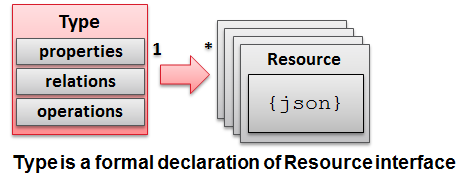Table Of Contents
General Definitions¶
In this document you will find the general overview of the APS type structure and the description of the section containing general properties.
In this document:
Type Definition Structure¶
APS schema consists of the following sections:
General Section: the general declaration of the APS type.
Properties: the definition of the resource properties.
Relationship: the description of the semantic relationship with resources of other APS types.
Operations: a list of non-CRUD operations supported by resources of this type.
Structures: reusable data structure definitions (to be used in the Properties or Operations sections).

General Section¶
An APS type definition contains the general section followed by the other four sections as presented in the following example:
{
"apsVersion": "2.0",
"name": "Mailbox",
"id": "http://your.domain.name.org/types/mail/mailbox/1.0",
"implements": [
"http://aps-standard.org/types/core/resource/1.0",
"http://aps-standard.org/types/mail/archiving/1.0"
],
"properties" : { "..." },
"operations": { "..." },
"relations": { "..." },
"structures": { "..." }
}
The general section contains the following attributes:
Attribute |
Required? |
Overview |
|---|---|---|
Yes |
The minimal version of the APS API required by this APS type |
|
Yes |
The fully-qualified APS Type ID |
|
Yes |
The “friendly” name of the type |
|
Yes |
The list of the APS types that are implemented (inherited) by this APS type (interface inheritance) |
|
No |
Permissions to resources for APS roles |
apsVersion¶
The apsVersion element declares the minimal APS API version that the APS type was written for.
This field is mandatory in any APS type definition.
id¶
The id element defines a fully-qualified, unique APS type ID in the
http://basename/major[.minor] format. For example:
http://www.aps-standard.com/infrastructure/pcs/1.1
http://www.odin.com/poa/mailbox/2.0
Please refer to APS Type ID for more details.
name¶
The name element is required for code generation and documentation purposes.
It will also be used to give a name to the top-level structure representing a resource instance.
Basically, this is a “friendly” name that is not visible anywhere outside of the type definition
file and cannot be used to refer to the type in other type definitions.
Note
As with all other names, the following naming pattern should be matched: ^[a-zA-Z_][a-zA-Z0-9_]*$. It must be a single word, no spaces allowed.
implements¶
The implements array contains a list of APS Type ID.
Each APS type that can be instantiated by an APS controller must implement at least the
http://www.aps-standard.org/core/resource/1.0
or the http://aps-standard.org/types/core/application/1.0 type.
See also the Type Inheritance section for more details.
access¶
The access attribute can control access to resources, properties and operations
for APS roles as described in the Access Attributes section.
When used in the general section of the type definition, the access attribute defines permissions
to all resources instantiated from the type.
access allows or disallows an actor to access a resource when that actor is either reading or
changing the resource, or calling an operation of the resource.
The access is granted for the roles that can be assigned to actors and for the public attribute
with the following default definition:
"access": {
"admin": true,
"owner": true,
"referrer": true,
"public": false
}
In the following example, a user related with a resource will be able to operate the resource as a whole object:
{
"apsVersion": "2.0",
"name": "Mailbox",
"id": "http://your.domain.name.org/types/mail/mailbox/1.0",
"implements": [
"http://aps-standard.org/types/core/resource/1.0",
"http://aps-standard.org/types/mail/archiving/1.0"
],
"access": { "referrer": true }
...
}
